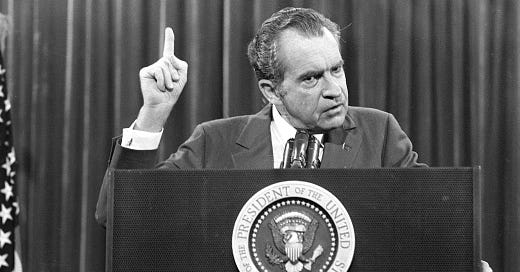In 2009, I wrote a post explaining my theory of the post-World War 2 Republican party. The gist of the explanation is that GOP leadership was mainly centered around Richard Nixon, who built his network around the issues of national defense, security, and anti-communism. This cohort of leaders ran the GOP from about 1952 to 2008. Here is the post. Tell me what you think. Next week, I’ll offer a response from the very Trumpy year of 2024. Enjoy.
+++++
For the last couple of weeks I’ve been trying to articulate an observation about post-war Republican politics – Nixonites have been the dominant group in elite GOP politics since the early 1950s until the present. I don’t consider this to be an original observation, but I do think that it’s been underestimated in its importance.
If you buy my argument about the importance of this observation, you might believe that it is a mistake to view the modern GOP as the party run by free marketers and social conservatives. Instead, these two factions have been subordinated to a third faction – the Nixonites – who endorse a different agenda focusing on foreign interventionism, national security, and increasing executive power. In other words, the narrative about Goldwater as the guiding light of the post-war GOP is wrong. Nixon, and his allies, have driven the agenda since the late 1940s. Other Republicans (Eisenhower, Goldwater, Reagan) represented factions who, at most, were allowed a seat at the table created by Nixon.
First, consider the following facts about the elite Republican leadership:
Nixon and his coalition were able to put themselves on the national ticket in 1952, which displaced earlier liberal Republicans.
Nixon and his personal friend Gerald Ford were in office in 1969-1975.
Regan – who had a different base than Nixon – had to accommodate another Nixon appointee – GHW Bush – as VP in 1980.
Bush (a Nixon appointee) was president from 1989-93 and brought in more Nixon/Ford appointees (e.g., Cheney) to run things.
Bush II’s campaign was run by a mix new folks (Rove, Hughes) and assisted by more old Nixonites (James Baker).
Bush II’s administration, until about 2006 or so, was lead by Nixon and Ford appointees (Rumsfeld, Cheney, Powell).
The Nixon network (him and former staffers/appointees) have been in control of the presidency or vice presidency every time the GOP has won the national election. Furthermore, this network has controlled key national security positions very often in GOP administrations.
How does play out in policy? First, cultural conservatism and market economics are occasional pay-offs to coalition members and talking points for the media, not core agenda items. These issues will be quickly sacrificed to win general election contests, though they might still play a big part inside the party (e.g., GOP politicians bow to pro-lifers in the primaries, but run away from the issue in the generals). In the 1970s, Nixon was notorious for pushing extremely liberal policies, just to drive a wedge in the opposition. Similarly, the last Bush administration was happy to drop cultural or economic hot button issues if they threatened to interfere with policy initiatives related to the War on Terror (e.g., faith based org subsidies, social security privatization)
If you believe this story, then conservative politics was not “reborn” after the Goldwater campaign in 1964 and cemented by Reagan. Instead, the Nixonites allowed this new ideological trend to be the face of the party, but they retained control over the institutional functions of the party, as evidence by Nixon’s resurgence. This observation explains a lot of other puzzling feature of Republican politics. This is not the party of small government, it’s the party of national security. The party of individual liberty and self-reliance is actually the party of “enhanced interrogation.” The idea tying it together is national security, with superficial appeals to whatever helps win the election.
+++++
Buy these books!
Open access/Free: Sociology and Classical Liberalism
Grad Skool Rulz - cheap ($5) advice manual for grad students
Obama and the antiwar movement
A Social Theory book you will enjoy reading




